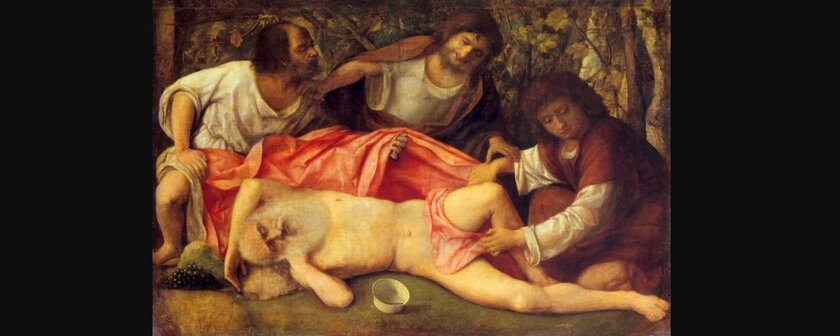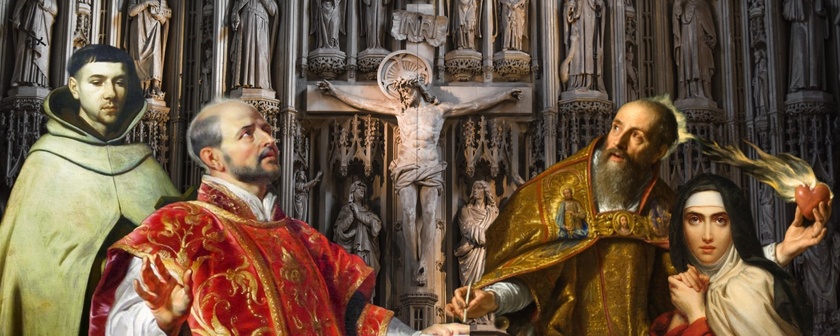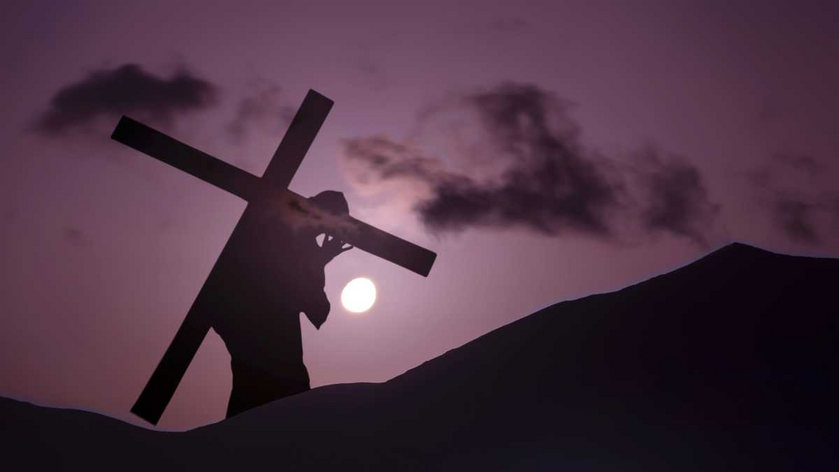When I wrote my article on the Eucharist, I thought about how long I had been away from the Church. While I went on retreat every year and confessed that I wasn't going, I realized that I had suddenly become an Easter-Christmas Catholic. It wasn’t that I had an issue with the Church or that I didn't want to be there, but I felt completely uninspired and, most important, a very heavy weight on my shoulders.
I took a job in 2011 in an area where I wasn't happy, felt very alone, and was clearly an outsider. The one space where I was welcomed by folks whenever I went in was a brewery near my office, so I spent a lot of time drinking and talking with people. Two years after, I moved “across town” to be in a nicer area that wasn't quite the concrete jungle that I left, but it was now a total of two hours of daily commuting, which eventually turned into three hours with increased school traffic and construction that magically popped up on different roads throughout the week, so there was no avoiding it.
During those years I had fallen into two rather un-Christianlike relationships, one of which completely destroyed my heart. It took me three months to prepare myself to leave him because I wanted to mean it when I walked away. It took upwards of a year for my heart to heal enough to be able to act normal and not be drowned in my sense of loss.
I finished my undergrad degree and completed my MBA during this time, and my method of coping, especially during rush hour, was to stop at a restaurant along the way and eat and drink for a couple of hours. Yes, it was alcohol, and by the time I finally quit my job in 2017, I was walking the fine line between alcohol abuse and alcoholism.
My last day of work was the Friday before Labor Day, and I immediately headed out for an annual camping trip with old friends from my East Lansing days. I felt very strange as I knew I was free and didn’t have to return to work, but of course my body and my brain didn't realize that new freedom and I still felt the weight. I went home and, for the most part, slept until January.
My drinking also suddenly ended with the exception of one bottle of wine per month. I suddenly didn't need alcohol and I simply wanted to sleep. It's a miracle I even obtained clients and completed work for my business that I started building while I was in grad school.
In January, I was working on prospecting and marketing, and suddenly I stopped, looked up, and realized that my spark had returned. I felt like myself again! I didn't need to sleep all day and I had a healthy relationship with alcohol. I felt like I was alive again, only that's debatable because when you're dead in this life, you don't actually recognize it.
I walked away from both a job and from dating – both things that were destroying me and causing me great pain. Looking back, while I still wasn’t on the right path, I began to clean the worst things out of my life, and started moving toward a place where I could heal. I continued my dark slumber doing what I thought I had to, trying to avoid further pain, but finding more. Finally, in 2021, I realized I couldn't handle this world anymore and I cried out to God to save me.
God very clearly paved the way over the course of the next eight months for me to finally return to the Church. That fall, I removed both spiritual and physical garbage from my life, and I returned to Mass in 2022. My life changed. A huge weight had been lifted off my shoulders and the fear and pain were gone. That is when I came back to life.
Do We See Our Own Suffering?
In recent months, I've read about some of the great Catholic saints and the correlation between mysticism and suffering. While pondering suffering in my life, I concluded that I had gotten off easy because I never really experienced suffering! Sure, I am getting older and my body hurts every day, but it doesn't really hurt in a way that hinders me or even really bothers me.
This is in contrast to the pain I suffered as a child. If I get a paper cut, it is usually only an annoyance if it bleeds. The bleeding might keep me from doing something for a couple of minutes while I apply pressure. But when I was four, if I got a paper cut, it was the end of the world and my mother had to deal with my torment, which I’m sure she shared with me for a different reason!
It’s fascinating how our tolerance to pain increases as we age. I’m inclined to conclude that our desensitization to pain throughout life is possibly due to God’s great mercy as we age and our bodies near the inevitable experience of death.
But then my thoughts went from physical pain to emotional pain. That's when I really started to ponder those 10 years of my life. I realized that I experienced an incredibly dark period that was cursed with sadness and anxiety and despair. The emotional pain manifested physically, in addition to the health issues I was having.
I realized that a lot of the suffering I endured was emotional, and I brought it upon myself. Had I not turned away from God, I likely would have endured hardship as that is a part of life, but it would not have taken such a toll on me, and it wouldn’t have been the emotional pain I experienced.
In Matthew 22:36-38, a Pharisee asked Jesus, “Teacher, which is the great commandment in the law?” And he said to him, “You shall love the Lord your God with all your heart, and with all your soul, and with all your mind. This is the great and first commandment.”
I failed to love God with all my heart, and that great sin spiraled into a collection of sins that led to my death.
How Sin Hurts
Last year, someone asked me to define sin. What is sin? This is something I often ponder because you can very easily look for the definition in numerous articles and in the Catechism of the Catholic Church, but I’m never truly satisfied with the answer. The Bible sets sin in a perspective of relationship. With that in mind, what does sin really do?
Sin sets itself against God’s love for us and turns our hearts away from it. (CCC 1850)
One example I’ve heard to help explain the impact of sin is to think of it in terms of cheating on your spouse. The damage of cheating hurts the relationship and shuts down communication. In order to repair the marriage, forgiveness and the honest intent to turn away from cheating is required for both to come together to heal the marriage.
Fr. Thomas Dubay, S.M., wrote The Fire Within based on his extensive experience as a spiritual director. The book taps into the writings of Sts. Teresa of Avila and John of the Cross as well as the Gospel as the foundation for personal prayer with the intent of communing with Christ. Dubay writes, “St. Teresa’s starting point is the absolutely basic condition for a serious prayer life: an earnest, continuing effort to rid oneself of sins, imperfections, and attachments. . . . Christic communion cannot be produced by techniques, because it is above all a love matter before it is anything else – and precisely because interpersonal intimacy is its heart, it is suffocated, even killed, by selfishness in any form.”
While I don't have as full of an understanding of sin as I would like, what I do know is that sin isn't simply a checklist of bad things you do. Sin is a block between you and God. It prevents you from entering into relationship with Him more fully precisely because you reject Him when you sin.
As I started traveling down this path of prayer, my understanding of sin evolved. Even small venial sins that are cleansed away from me each morning when I receive the Eucharist are now problematic for me, because I see them as slowing my ability to truly experience God in my daily prayer. Experiencing God, hearing God, having Him in my daily life is far better than any sin of pleasure.
The Difference between Life and Death
When the thought of those 10 years of my death suddenly came to the forefront of my mind, it was a bit of a surprise when I subsequently heard the following reading at Mass. Jeremiah had summed up both my years of death as well as my current state in life.
Jeremiah 17:5-10 (NAB)
Thus says the LORD:
Cursed is the man who trusts in human beings,
who seeks his strength in flesh,
whose heart turns away from the LORD.
He is like a barren bush in the desert
that enjoys no change of season,
But stands in a lava waste,
a salt and empty earth.
Blessed is the man who trusts in the LORD,
whose hope is the LORD.
He is like a tree planted beside the waters
that stretches out its roots to the stream:
It fears not the heat when it comes,
its leaves stay green;
In the year of drought it shows no distress,
but still bears fruit.
More tortuous than all else is the human heart,
beyond remedy; who can understand it?
I, the LORD, alone probe the mind
and test the heart,
To reward everyone according to his ways,
according to the merit of his deeds.
I read my Bible every morning before Mass, and on the morning of the Jeremiah reading, I read the first three chapters of John. While there was so much that I was excited about and underlined, the one thing that stuck out to me was, “What do you seek?”
Jesus asked, “What do you seek?” and I felt like that was very personal. I recalled the question several times throughout the Mass, and suddenly my mind went to the things that I saw while I was dating and in friendships that are now in the past.
If you look at my friendships, these are people who love me for who I am, and they allow me to love them as my friends. And while many of them aren’t even Christian, they aren’t threatened or offended by me being Catholic. These friendships are one of the things that I treasure most in this life. I didn’t always have this though. Many of my friendships throughout my life centered around how I made people feel and what I could do for them, but they rejected me for who I really was and what I believed.
When it came to dating, I wanted nothing more than to find someone who would love me for whom and what I am without requiring me to live up to ridiculous or weird standards that prevail in our culture. I also wanted to be able to love someone without them rejecting that love or feeling that it was too much. The irony is that I don't exactly wear my heart on my sleeve, and I struggle to open up to someone I can’t read, so there are some people who are difficult for me to talk to, romantic or not. I later realized that the men I was dating did not want a serious relationship, and those experiences combined with my observations of society led to me closing my heart to people.
As I walk with God, He probes my heart and moves into the dark wounded areas. Sometimes it hurts, but it always heals. I firmly believe that God loves me as I was at my worst, as I am now, and as I will be at my best. Even more, He allows me to love Him as much as I can, with as little as I have. It's not only enough, but never too much, and perfect.
“What do you seek?” He asked me. The complexities of relationships and feelings rapidly flashed through my mind, and part of me rejected those thoughts as none of those things seemed to be the answer. My heart finally rested on one thing: Heaven. And He gives me life as He draws me near.
***
My Struggle to Believe in the Real Presence of Jesus Christ in the Eucharist: How It Is Transforming My Life - https://dibear.locals.com/post/5252947/my-struggle-to-believe-in-the-real-presence-of-jesus-christ-in-the-eucharist
Fire Within: St. Teresa of Avila, St John of the Cross, and the Gospel on Prayer by Thomas Dubay, S.M., Ignatius Press, 1989.

















